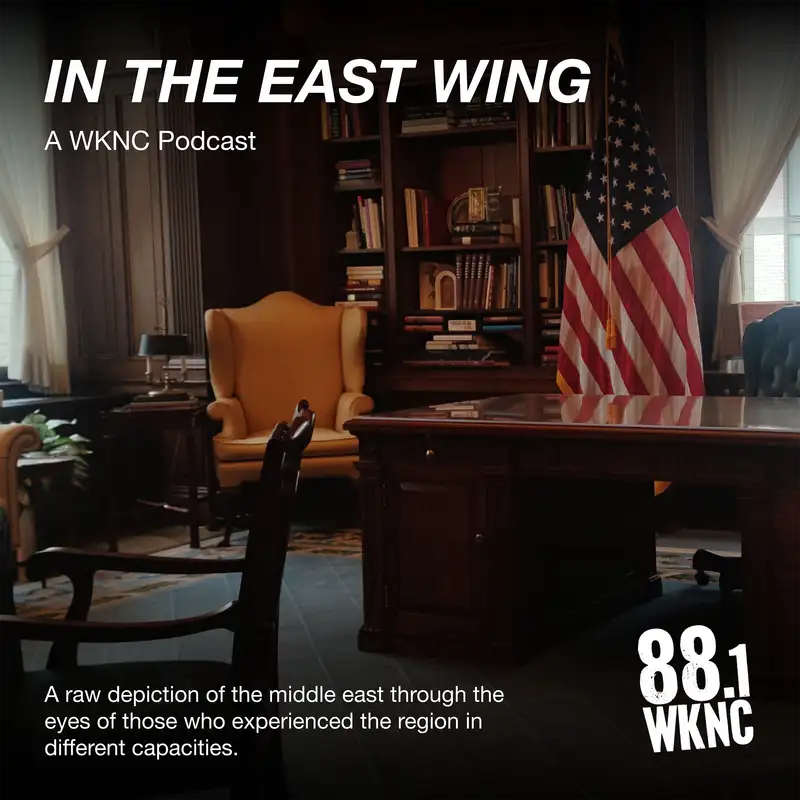A Short Interview With Special Operator Bob Burton
Download MP3Abdullah Najjar 0:00
All right, so this is my conversation with Bob Burton. Bob is a retired Green Beret who spent approximately 30 years in the US military. He is an international best selling author, a leadership Coach and Trainer with the John Maxwell team, and an NC State University Executive in Residence. Bob has done so much after he retired from the US military, and has been quite active in many different fronts and in his conversation, even though it is rather short, we touched on some of the key traits that make someone succeed in becoming a Green Beret. In any case, this is a short conversation, shorter compared to other episodes that I've recorded, but it is worth highlighting that there was a technical issue with the audio. So this is the sum of the parts that we managed to recover, but we will make sure to perhaps record another episode with Bob to go over a few other things that might be of interest to you. So without further ado, here's my conversation with Bob. Well, Bob, thank you so much for joining me in the East Wing. It's a pleasure to have you here.
Bob Burton 1:16
Thanks, Abdul. It's really a pleasure to be here. Thanks for for having me on the show. And I'm looking forward to just sharing a little bit about my journey and maybe and maybe some some leadership nuggets that I've learned along the way.
Abdullah Najjar 1:25
Absolutely so I I'm very impressed, first off, with your story, because you've spent 30 years in the US military, and 10 years of your career was spent in the special forces units, if I'm not mistaken, and that is very, I think, admirable. And so before we even explore some of the, I guess, some of the lessons learned from that experience, or perhaps some of the things that you were very, maybe, missions that you're involved in, I would love to ask, how you how this whole thing started. How did you get into the military? What triggered it?
Bob Burton 2:08
Yeah, a really great, great, great starting point, kind of back at the beginning. Well, just picture a small town farm in upstate New York. Yes, there is an upstate and there is a lot of farms. So that was me meager, very, you know, modest and humble beginnings, which is good because that meant a lot of hard work. But when I say humble beginnings, really didn't have much as far as resources or money, so the military became a very appealing option. Plus, I wasn't ready to go off to to college, which is kind of interesting that I'm on the UNC Charlotte campus today, which is pretty awesome. So lifelong learning really became a part of my my journey and but nonetheless, yeah, so join the military right out of high school, 17 years old, my parents had to sign for me. A little bit humbling there as well. But again, the greatest generation you know had to do the same thing. Got folks that are joining very, very early in life, and for me, it was the best decision I ever made. So joined for two years and went off to war. Went off to the Gulf War first. Before that, I was stationed in Germany. I was a combat engineer, which was I really enjoyed building and then blowing stuff up, which was pretty cool. Then went off to the Gulf War in the early 90s, of course, 90 and 91 and was part of something much bigger than I had ever seen or ever imagined. It was no longer just my unit, but it was a worldwide effort, you know, in order to defeat tyranny in that part of the world. And from that, you know, kind of from those ashes, I watched and saw different units emerge, and I saw as part of an engineer unit, and we supported tankers and, you know, really neat. But then I saw some special operations guys and, and that's when I made the decision. And again, that was at this point about about 35 years ago. So yeah, most of my career was, was in special operations. I was a special forces Green Beret, worldwide deployments. But yeah, from from simple beginnings to really challenging myself and just joining the the elite forces that protect and and Vanguard to safeguard this nation.
Abdullah Najjar 4:22
Gosh. I mean, think I may have made a mistake earlier, saying that it was 10 years so it must have been more than that. Your career in the in Green Berets, correct? Wow. How. What does it take for someone to join the special operations or to become, become a eight Green Beret. What's the
Bob Burton 4:42
you know, I was, yeah, I was kind of pondering that when I was walking around campus here today. Uh, Number one mindset, when you get your mind set on the stars, you're going to reach them, if you're if you're only set on the horizon, that's only as far as you're going to go. Yeah, and I always knew that I was, you know, created for something more, and that'll kind of tap into my faith journey as well. But nonetheless, you know, be all you can be was the army slogan. And then I joined special operations, and it became the oppressor Lee bear is to free the oppressed. So I went from be all I can be to freeing the oppressed around the world, you know, those who are economically, militarily, you know, under oppression and things like that. And that's why Special Operations really appealed to me to go that route, because what we're made for so much more than than we can imagine. And it's not about us, it's always about those lives that we can impact and change.
Abdullah Najjar 5:41
That's beautiful. No, it really is. I think, having a purpose and understanding where, where you're headed in life. I mean, these things can be for a lot of people can be missing, but knowing that from a pretty much an early age, and having, I guess, sort of faith to lean on to that that is very impressive. I mean, how often were you? How often did you see that? See these two traits materialize in some of your brothers and sisters in uniform?
Bob Burton 6:19
Yeah, really interesting. When you're in a conflict zone or a combat zone, all you have to rely on is the person to your left and to your right. When you're put in a circumstance, because that's what you have. And if you don't have the person to your left and to your right, you've got to rely on someone greater than you. And for me, that's God. So actually quite a bit. I think everyone has a measure and a degree of faith. We just need to act on that faith and then actually live out that faith. And for me, my faith is in is in God, is in Christ, Jesus, my Lord. And to me, that was a defining moment in my life. But, but there's, there's faith everywhere you go. But like I said, my my faith was just really grounded, and it wasn't till years later. I it wasn't. I didn't join the military right away with a good, solid faith foundation. However, I did have a prayer warrior of a mother. So here's to all the mothers out there. My mother was a prayer warrior. I taught. She learned. She taught me a lot. I learned a lot from her just watching her. And I learned how to pray, how to trust, how to rely, you know, on God and and to put my faith and trust in Him. So again, here's to all the mothers out there, man, can
Abdullah Najjar 7:30
I? Can I ask you, Bob about the preparation that you have to go through to join Special Operations. I mean, you, you must have had, I guess, a goal in mind, right? And you must have maybe little bit of faith, right? But there must have been other things involved in the process of preparing to join. You know this, this very, I guess it's very unique branch or very unique unit of the military, that makes sense?
Bob Burton 8:05
Yeah. Number one, really, it goes back to the mindset, and when you set your mind on anything you can and will accomplish it. Now, in order to keep up with your mind, you have to train, discipline and condition your physical body. That's where nutrition comes in, of course, physical fitness really, believe it or not, emotional resilience and surrounding yourself with the people, others who are going where you're going, who have goals that are bigger than themselves, and then surrounding yourself. So I had partners that I used to train with. We would go out late at night, we'd work all day, and then, hey, at night, we're going to go out on a ruck march. We're going to go on a 1012, mile ruck, really kind of a run, because we used to do a lot of lot of running, is that the whole idea in Special Operations is, is to close the distance, get to the objective, execute the mission, and then get off the objective, and then x fill back to, you know, friendly or safe territory, all without being detected. So of course, that requires a tremendous amount of stamina. And for me, I played lacrosse in high school. So I highly recommend any kind of a sport, get involved with a sport. Get off the video games, get out. Play soccer in the grass field, in the courtyard, whatever you got to do. But for me, it was, it was lacrosse and did a lot of running. Fortunately, I was, I was blessed to be very, very fast. Kind of grew up chasing cows, most literally, because we would move them from pasture to pasture, and that's how we did it. We ran after them. So, yeah, so any kind of exercise that we that you can do, so setting your mind, your mindset, and then physical conditioning, physical stamina, and then just discipline that you're never going to quit. And yeah to me that those are really keys to success,
Abdullah Najjar 9:44
and this is where we unofficially wrap things up. I want to thank Bob for joining me here today, and for all our listeners out there, and we again apologize for the technical difficulty, but please stay tuned as there is more to come from from the east wing.
Transcribed by https://otter.ai

